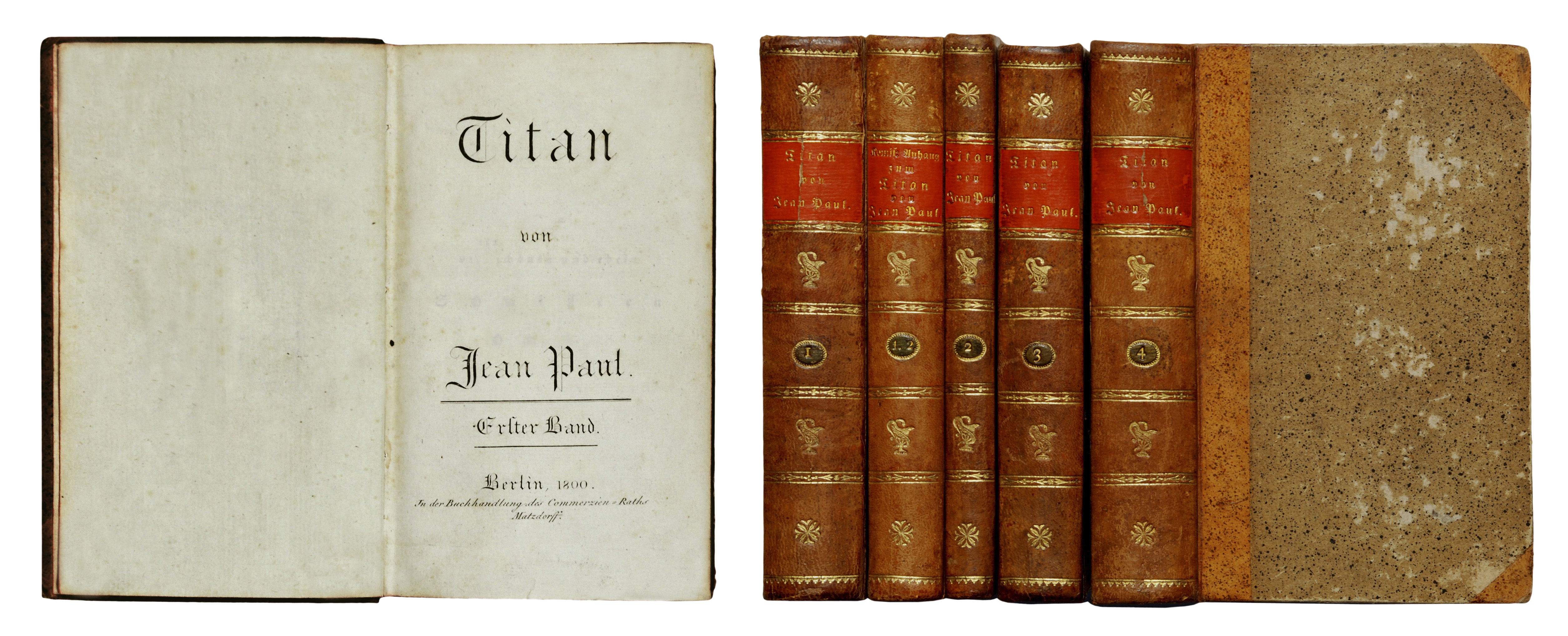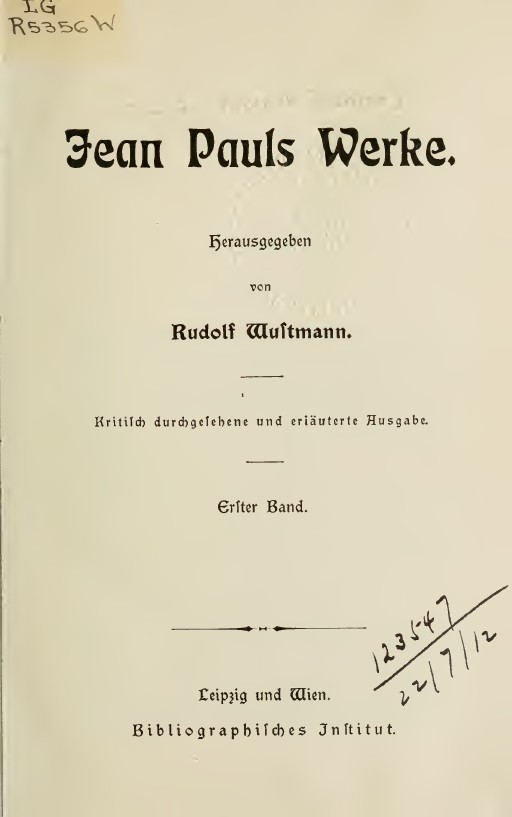Titan (Jean Paul Novel) on:
[Wikipedia]
[Google]
[Amazon]
 ''Titan'' is a novel by the German writer
''Titan'' is a novel by the German writer 
 ''Titan'' is a novel by the German writer
''Titan'' is a novel by the German writer Jean Paul
Jean Paul (; born Johann Paul Friedrich Richter, 21 March 1763 – 14 November 1825) was a German Romantic writer, best known for his humorous novels and stories.
Life and work
Jean Paul was born at Wunsiedel, in the Fichtelgebirge mountain ...
, published in four volumes between 1800 and 1803. It was translated into English by Charles Timothy Brooks in 1862.

Plot
Divided not into chapters but into "jubilees" and "cycles", ''Titan'' comprises some 900 pages and tells the story of the education of the hero Albano de Cesara, his transformation from a passionate youth into the mature man who ascends the throne of the small principality of Pestitz.Style and themes
Jean Paul called ''Titan'' his "cardinal and capital" novel. In language and style the novel differs strikingly from other texts by the writer. The narrative, despite its sentimental and effusive manner, and rich descriptions, is tightly organized and contains fewer digressions and side notes. This is often seen as a temporary approach to the classicism of Weimar, which Jean Paul at this time was subjecting to an intensive and critical examination. The rich imagery and comic misdirections are still present, and the novel remains challenging for today's readers. Jean Paul considered using the title ''Anti- Titan'' in order to express more clearly the idea of hubris, of the inevitable doom of the ''Himmelsstürmer'' ("Heaven-stormers") of Romanticism. His aim was also to condemn "the indiscipline of theSaeculum
A is a length of time roughly equal to the potential lifetime of a person or, equivalently, the complete renewal of a human population. Originally it meant the time from the moment that something happened (for example the founding of a city) unt ...
" and the separation of the self from contemplation. In the characters of the novel (Roquairol, Schoppe, Gaspard, Liane, Linda) Jean Paul crystallizes various European controversies of the year 1800. In the end, all characters but the hero come to grief as a result of their one-sidedness. With Schoppe, the idealistic philosophy of Fichte
Johann Gottlieb Fichte (; ; 19 May 1762 – 29 January 1814) was a German philosopher who became a founding figure of the philosophical movement known as German idealism, which developed from the theoretical and ethical writings of Immanuel Ka ...
is criticised; in Roquairol the aesthete and ''l'art pour l'art'' (Jean Paul's conception of the Weimar ideal); Gaspard encapsulates cold political calculation; Liane, a fanatical religiosity (pietism
Pietism (), also known as Pietistic Lutheranism, is a movement within Lutheranism that combines its emphasis on biblical doctrine with an emphasis on individual piety and living a holy Christian life, including a social concern for the needy an ...
, the Moravian Church
, image = AgnusDeiWindow.jpg
, imagewidth = 250px
, caption = Church emblem featuring the Agnus Dei.Stained glass at the Rights Chapel of Trinity Moravian Church, Winston-Salem, North Carolina, United States
, main_classification = Proto-Prot ...
); in Linda the purportedly unseemly hubris of emancipated women. The contemplation of these examples teaches the hero to be harmonious, a mature concord of strengths rather than an individual of one concentrated power. It has been frequently commented, however, that the doomed characters are perhaps more interesting than the sometimes too smooth and perfect-seeming main character Albano.
Legacy
Gustav Mahler composed a 'tone poem' titled after this novel,Mahler's high regard for Jean Paul is mentioned on p. 119 of the translation ofBruno Walter
Bruno Walter (born Bruno Schlesinger, September 15, 1876February 17, 1962) was a German-born conductor, pianist and composer. Born in Berlin, he escaped Nazi Germany in 1933, was naturalised as a French citizen in 1938, and settled in the U ...
's biography ''Gustave Mahler'', London, 1958. although in the process of revising the work he dropped the name and the 2nd movement, and the work was transformed into Mahler's First Symphony, with the composer afterwards discouraging any attempt to seek connections. Erich Heckel
Erich Heckel (31 July 1883 – 27 January 1970) was a German painter and printmaker, and a founding member of the group ''Die Brücke'' ("The Bridge") which existed 1905–1913. His work was part of the art competitions at the 1928 Summer ...
was inspired by the figure of Roquairol while painting a portrait of his friend Ernst Ludwig Kirchner
Ernst Ludwig Kirchner (6 May 1880 – 15 June 1938) was a German expressionist painter and printmaker and one of the founders of the artists group Die Brücke or "The Bridge", a key group leading to the foundation of Expressionism in 20th-century ...
.
Notes
Bibliography
* Dorothea Berger. ''Jean Paul Frederic Richter.'' Twayne Publishing, 1972. * Alan Mehennet. ''The romantic movement.'' Rowman & Littlefield, 1981. 1800s novels German bildungsromans 19th-century German novels Novels by Jean Paul {{1800s-novel-stub